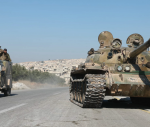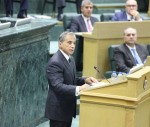You are here
The King’s files to Kremlin
Aug 22,2021 - Last updated at Aug 22,2021
His Majesty King Abdullah will meet in Moscow on August 23 with Russian President Vladimir Putin. The talks will touch upon the issue of the two-state solution, occupied East Jerusalem, the Syrian, Libyan and Yemeni files. On the two leaders’ agenda will also be the recent developments in Afghanistan and their repercussions on the Middle East, central Asia and the territory bordering the Russian Federation. The King will also discuss economic, military cooperation and political coordination between the two countries.
His Majesty’s visit comes a month after His visit to Washington and His meeting with US President Joe Biden. King Abdullah was the first Arab leader who met Biden since taking office. The King’s talks with Biden and the US administration dealt with thorny files in the Middle East, during which the King was able, through his farsighted vision, to convince Biden of the threats that the Middle East will undergo and the significant role Jordan can play to restore the region’s stability and confront the hotbeds of extremism and terrorism that constitute a growing concern for the international community.
King Abdullah’s visit to the Russian capital and His talks with the Russian leadership come after his meeting with Palestinian President Mahmoud Abbas a few days ago in Amman, where the two sides stressed the need for a two-state solution, with an emphasis on the status of East Jerusalem and the Hashemite guardianship of Islamic and Christian holy sites in the holy city.
A number of Russian experts and specialists in Middle Eastern issues believe that the King and the Russian leadership will thoroughly deliberate the recent developments in southern Syria and their ramifications on northern Jordan, in addition to the efforts of both countries to combat terrorism.
A number of experts also believe that Russia is working increasingly to boost its role in the Middle East as a regional player due to the geographical proximity between Russia and the Middle East states. Some American political experts echoed the perspectives of their Russian counterparts, especially in light of the prevailing tension on the Syrian and Lebanese arena, which was recently represented by Israeli missile strikes on sites in Damascus and Homs.
According to Russian sources, His Majesty is highly appreciated by the Kremlin and the Russian government, who consider King Abdullah an enlightened leader with an open mind. Some of the experts recalled what King Abdullah emphasised in many of his speeches and press interviews when he labelled the radicals and extremists as Kharijites (Khawarej) and that a holistic approach to dealing with them is a must, considering that the defeat of terrorist organisations in Iraq and Syria does not mean the defeat of extremism because these people move between countries as such groups seize opportunities to attack.
The last meeting between President Putin and King Abdullah was in October 2019 in the Russian city of Sochi. On February 3, Russian Foreign Minister Sergei Lavrov hosted his Jordanian counterpart Ayman Safadi in Moscow. After their meeting, Lavrov stressed common denominators between Russia and Jordan on Syria, Gulf security, Israel and Palestine.
During the past two decades, King Abdullah visited Russia 19 times, during which He met with the Russian leadership. In October 2019, His Majesty expressed support for the "strong presence of Russia" in Middle East affairs. The Jordanian leadership considers Russia an essential pillar of the emerging multipolar order in the Middle East and north Africa. The Jordanian and Russian leadership built their future relationship on the foundations of the growing commercial ties and partnership, and their views in regard to Syrian and Libyan affairs.
Trade between Russia and Jordan increased from $156.9 million in 2017 to $603 million in 2018. Russia has also expanded its wheat exports to Jordan, seeing Jordan as a springboard to enter agricultural markets in the Middle East.
Russian strategic researchers believe that Russia considers Jordan a privileged partner in regional security issues. There is great cooperation between Jordan and Russia in military and security domains after Moscow’s military intervention in September 2015 in Syria. In October 2015, Lavrov stated that Russia had coordinated with Jordan Russian air campaign in Syria. Later, a working mechanism was established on Russian-Jordanian cooperation in combating terrorism.
These researchers believe that the Chechen Jordanians are working to strengthen bilateral relations between the two countries, as Chechen President Ramzan Kadyrov enjoys a strong relationship with King Abdullah. In 2007, Kadyrov met Chechens in Amman. In June 2014, His Majesty visited Chechnya, where he met Kadyrov. Furthermore, the presence of Circassian Jordanians has also helped to develop relations between Central Asia and Jordan in various fields.
Amman views Moscow as an essential partner because Russia stands at the same distance from all parties in the Middle East conflict. This positively contributes to reviving negotiations on the two-state solution and soothing tension with Iran. To many Russians and Americans, the King’s visit will be a consolidation of Jordan’s role as a mediator between the United States and Russia in Syria and elsewhere. Amman has started its diplomatic activities to revive the peace talks between the Palestinians and the Israelis, seeking Russian and American involvement as key sponsors of the peace process to resolve the conflict and sustain stability and security to the region.











